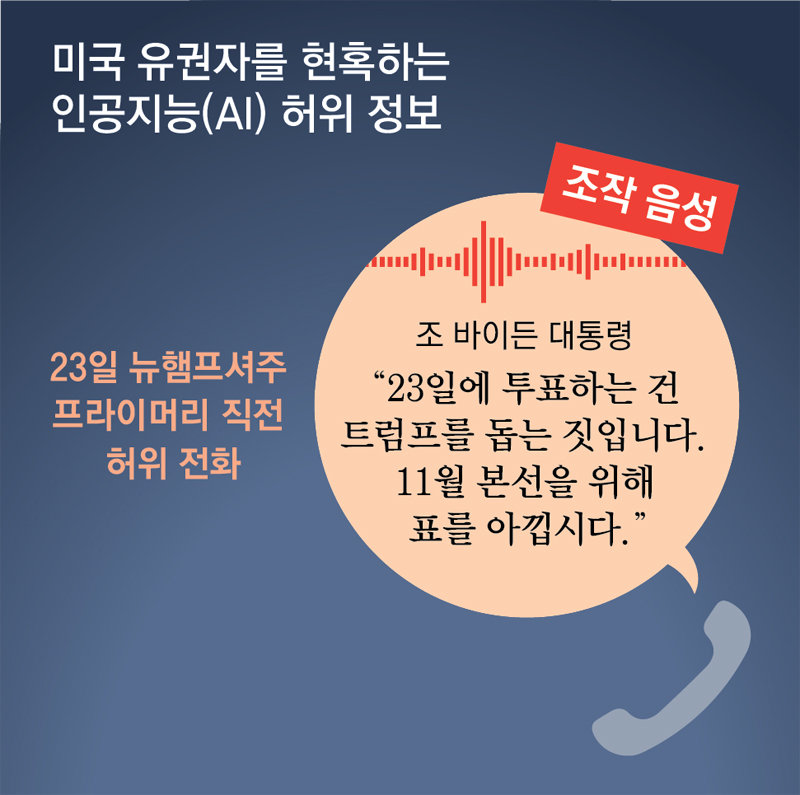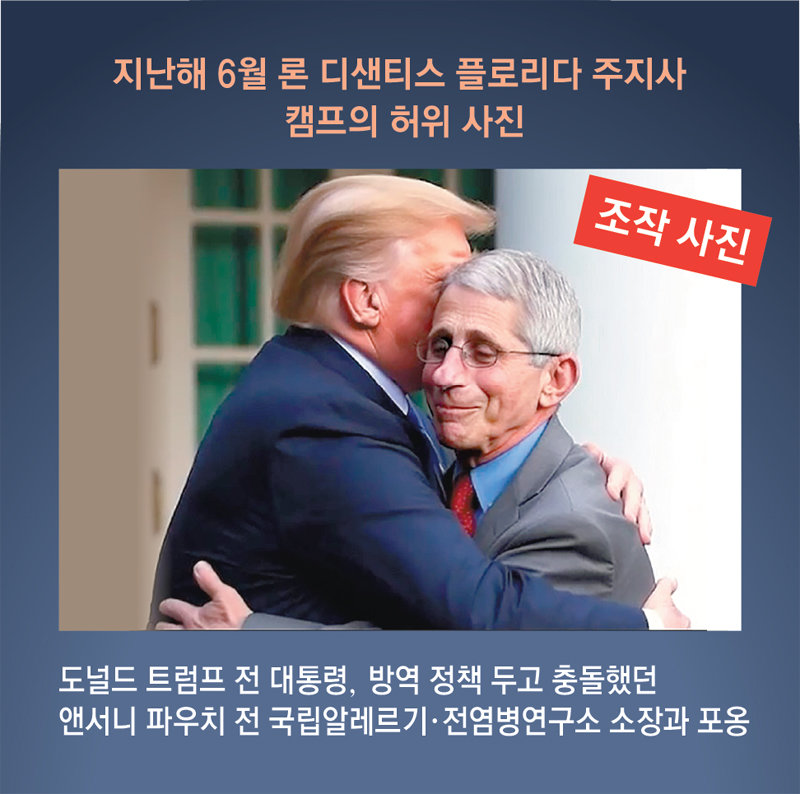[2024 美 대선]
Impersonating Biden, “Don’t vote in the primary”
Phone message to up to 25,000 people
First investigation into false information misuse of AI in US presidential election
Ahead of the New Hampshire primary on the 23rd, the second gateway to the U.S. Republican presidential nomination, a deepfake voice impersonating Democratic President Joe Biden and recommending that he not participate in the primary was distributed, prompting the state government to The investigation began on the 22nd (local time). Warnings that false information exploiting artificial intelligence (AI) will pose a serious threat to democracy are becoming a reality. This is also the first time that an investigation has been conducted into the spread of false information abusing AI since the start of this presidential primary.
The New Hampshire Attorney General’s Office said on this day, “We received a report about a robocall message that sounded like President Biden’s voice but appeared to be artificially generated. “It is an illegal attempt to interfere with the primary and confuse voters,” he said, adding that he was investigating this. CNN reported that this message was distributed to up to 25,000 people.
This voice impersonating President Biden said, “Some Republicans have been pressuring independents and Democratic supporters to participate in the Republican primary, but this is nonsense,” adding, “It is important to save votes until the November presidential election.” claiming. It is completely false information that if you participate in a specific party’s primary, you will not be able to vote in the presidential election.
It is not clear who created this message and why it was distributed. However, President Biden’s presidential campaign criticized it, saying it was “unacceptable spread of false information.” Former President Donald Trump also said, “It has nothing to do with us.”
Following his landslide victory in the Iowa caucuses on the 15th, former President Trump is confident of victory in New Hampshire, where non-party members can also vote. At a campaign rally on the 22nd, he pressured his rival, former U.S. Ambassador to the United Nations Nikki Haley, to resign. On the other hand, former Ambassador Haley expressed her intention to continue the primary, saying, “The United States is not a country that holds coronations.”
“Don’t vote in the primary,” Biden’s false negative… New Hampshire: “Interference with primary election – voter confusion”
Concerns about AI misinformation being misused by politicians… ‘Deepfake regulation’ social pressure expected to increase

“Voting in the primary on the 23rd is helping Donald Trump (former president). “Save your vote for the main election in November.”
On the 20th (local time), a familiar voice was heard on the mobile phones of voters in New Hampshire, USA. It was US President Joe Biden. He also used the same phrase, “Malarkey,” which he usually likes to say. The call was made to the contact number of Cathy Sullivan, former New Hampshire Democratic Party chairwoman, and the recorded voice was automatically played.
This call, which encouraged ‘not participating in the primary’ with a plausible packaging, was neither recorded by President Biden nor made by the Democratic Party. It was a false negative created using artificial intelligence (AI) to target voters heading to the polls. After the primary began in earnest, the US presidential election was turned upside down as the first case of an attempt to sway the situation by abusing AI was revealed.
Foreign media outlets analyzed that this incident would have had a significant impact on the New Hampshire primary, in which all voters can participate regardless of party affiliation.
President Biden, the protagonist of the ‘fake voice’, did not even register as a candidate in the Democratic Party’s New Hampshire primary. This is because of the conflict between the Democratic Party and state election authorities. The Democratic Party decided to hold its first primary in South Carolina on the 3rd of next month, saying that New Hampshire, which traditionally held the first primary, is low in representation due to its high proportion of white people.
New Hampshire protested against this and decided to push ahead with the schedule. However, the Democratic National Committee decided not to acknowledge this and President Biden will also not participate. As President Biden’s name was excluded from the ballot, supporters are conducting a ‘write-in vote campaign’ by directly writing “Biden.” Former Chairman Sullivan said, “This call was planned by someone to hurt President Biden,” and criticized it as “an attack on democracy.”
There is also a conspiracy theory going around that the Trump camp is behind it. It is said that the intention is to prevent independents or Democratic Party supporters who want to vote for former U.S. Ambassador to the United Nations Nikki Haley, her rival in the Republican primary, from showing up at the polls. Former President Trump’s side drew a line, saying, “It has nothing to do with this incident.”
False information spread over the phone like this leaves little trace, making it more difficult to verify the source. Jonathan Nelson, director of spam call prevention company ‘Haiya’, predicted to the economic media Business Insider, “It will be an unprecedented election year due to automated voice calls synthesized with AI.”

There is also great concern that as the public becomes accustomed to false voices, photos, and videos created by AI, a situation may arise where politicians abuse them. This is because confusion about what is true and what is not can lead to a counterattack, calling it ‘fake news.’ Aviv Ovadia of Harvard University’s Berkman Klein Center predicted in the Washington Post that there may be an increase in the number of cases where politicians get away with criticism by claiming that it is “fake evidence manipulated by AI.”
In fact, such cases are increasing. Last December, the anti-Trump group ‘Lincoln Project’ ran an advertisement showing a video of former President Trump’s verbal mistakes and claiming, “Trump may be suffering from dementia.” Former President Trump immediately criticized it as a “fake advertisement made with AI,” but U.S. media outlets, including PolitiFact, refuted that the videos used in the advertisement themselves were not fabricated, but actual videos that had already been reported in the media.
In the United States, Open AI is taking self-rescue measures such as preventing the use of the interactive chatbot ‘ChatGPT’ or the generative AI ‘DALL-E’ in election campaigns. However, there is no unified AI regulation at the Federal Election Commission (FEC) level. In Korea, election campaigns using deepfakes will be banned from the 29th of this month.
However, as the US presidential election approaches, social pressure to resolve the lack of legislation is expected to increase. Until last year, some states, including Washington, California, and Texas, had enacted deepfake regulation laws, and related bills have been proposed in at least 13 states this year. Public Citizen, a progressive watchdog group, told the New York Times (NYT) that “the moment for political deepfakes has arrived” and urged legal protections to be put in place quickly.
Laconia =
Source: Donga
Mark Jones is a world traveler and journalist for News Rebeat. With a curious mind and a love of adventure, Mark brings a unique perspective to the latest global events and provides in-depth and thought-provoking coverage of the world at large.